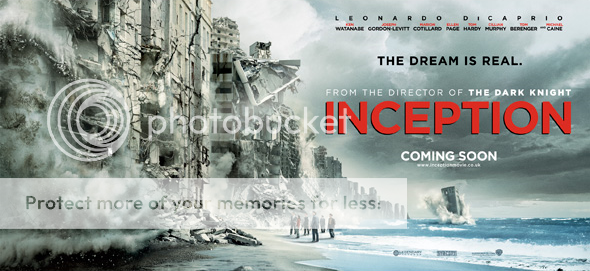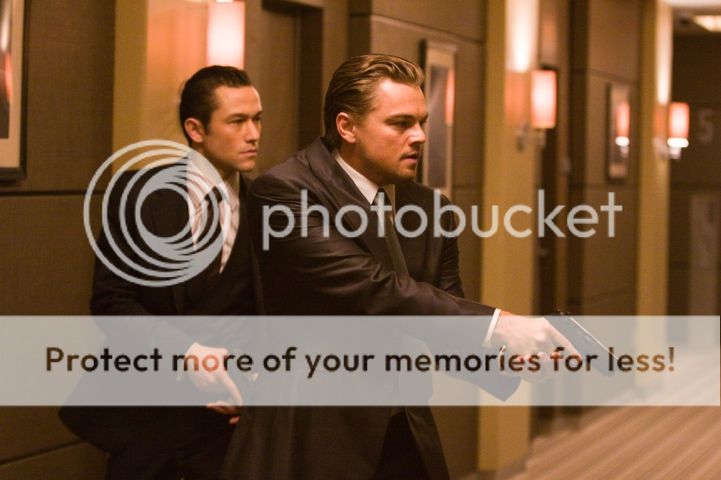
“What is the most contagious parasite?” asks Leonardo DiCaprio’s character Mr. Cobb in the early moments of Inception. “An idea.” From the tiniest seed, it spreads like a virus, he explains. This is what makes it vulnerable to manipulation and theft. In many ways, the same could be said for Inception itself. Bending time, delving layers of dreams within dreams, shifting between reality and fantasy, the movie is instantly contagious. By the final shocking scene, when four concomitant worlds finally weave together in a breathlessly taut salvo, one is left downright feverish. It also happens to be one of the smartest, best-written, enigmatic additions to the typically content-light action genre. ScriptPhD.com’s full review of Christopher Nolan’s chef d’œvre under the “continue reading” cut.
REVIEW: Inception
ScriptPhD.com Grade: A

If Inception aims to be a mind-perplexing, labyrinthine race through the recesses of the dream-wake state, it boldly states so in its opening minutes. DiCaprio’s Cobb is deeply ensconced in a mission. Whatever shady company employs him has made information in Japanese business man Saito’s (Ken Watanabe) safe his ultimate mission. From trains, to Asian apartments, to Saito’s office, we criss-cross with Cobb and his team of co-dreamers (engineers) as they hone in on the target. A mysterious brunette (Marion Cotillard) named Mol stops Cobb in his tracks. She is his deceased wife, who shows up in the next dream layer to betray him on the cusp of completing the job. The plot is foiled, but not enough to leave Saito unimpressed with Cobb’s talents. Seito commissions him for one last ambitious project, to invade the dreams of magnate heir Robert Fisher and convince him to dissolve the company. Rather than extracting an idea, Cobb will practice ‘inception,’ his most difficult task to date. Both men have important incentives. Seito’s corporation will lose a major competitor in the energy sector. And Cobb will receive immunity to return home to his children, where he has been a wanted fugitive for the murder of his wife.
The idea of dream manipulation is, of course, neither new nor scientifically far-fetched. It is no big secret that the film is based on Christopher Nolan’s own experiences with lucid dreaming, a dream in which the sleeper is aware that he/she is dreaming. Lucid dreaming expert Robert Waggoner, recently interviewed about the lucid dreaming telepathy that Inception is based on, insists that it is a very real phenomenon. Waggoner recounts the experiments of three physicians conducting research in a sleep lab in Brooklyn and “found considerable evidence of this inexplicable, yet fascinating, phenomenon.” Furthermore, the idea of planting seeds through dreaming—known as dream incubation—has a couple of successful studies attached to it. The only difference is that dream incubation involves planting an idea in order for a specific dream to happen, whereas in Inception, the dream agents invade dreams. Nevertheless, while scientists can now easily image the sleeping brain through fMRI technology, including mind-reading software that could record dreams, technology to the degree found in the film is, while not a theoretical impossibility, still a longshot. Thankfully.
But back to fantasy. Cobb will use multiple layers of infiltration, dreams within dreams, each of which expands time to a greater degree, to implant his idea during the course of a ten-hour flight from Sydney. He anchors his team around a brilliant architect (Ellen Page), who will design the world of the dreams, borrowed from his psychologist father-in-law (Michael Cain). A chemist provides a secret formula for strategically sedating all the lucid dreamers. The rest of the team (including a scene-stealing Tom Hardy) acts as… security, of sorts. Once the plane lands, Cobb is a free man. The plan is simple. Until it gets complicated. The presence of opposing security forces in Fisher’s subconscious indicate that he’s already been trained against mind manipulation. They immediately endanger the entire team and force improvisation through the rest of the operation. The knockout kink in the armor is the tragic secret driving the film’s shocking conclusion. It is both how Cobb knows that the idea of inception works, and the last stand that he must fight—within layers of dream, no less!—to save his team and go home. The last one hour of the movie, the payoff for the complex setup, is so poignantly beautiful and sequentially well thought-out, that we will not even speak of it lest we ruin a single detail for our readers.

While Inception is sure to have its detractors—too complicated! too esoteric! too many layers—the simple fact is that in this masterpiece, Christopher Nolan has bestowed moviegoers with one of the most complete cinematic pieces of recent memory. His script is tight, layered, cathartic and cheeky at just the right tense moments, and evinces a similar sympathetic frustration from the audience as his other mind-bending memory chess game, Memento. To say nothing of the pitch-perfect action sequences, Nolan’s directorial and camera choices (ideal for viewing in the IMAX experience) make the twisty, jumbled, misshapen dream layers jump off the screen and invite you into them. And finally, credit must be given to Inception‘s strongest silent character: the brilliant design and art direction. Perpetual staircases. Entire blocks of Paris folded onto one another like sheets. Dream layers that jump from Southeast Asia to New York to the ice tundras of the Arctic’s moutaintops. Imagined universes full of skyscrapers, bridges, and Pritzker-worthy architecture. If the trick to a successful inception is to create a world realistic enough to fool the dreamer into acquiescing their subconscious thoughts, with his technicolor palette and rich imagination, Nolan simultaneously pulls the rest of us in, as well.
Sweet dreams, everyone.
Inception goes into wide release at theaters nationwide Friday, July 16th, 2010.
Official Inception trailer:
~*ScriptPhD*~
*****************
ScriptPhD.com covers science and technology in entertainment, media and advertising. Hire our consulting company for creative content development.
Subscribe to free email notifications of new posts on our home page.
]]>
